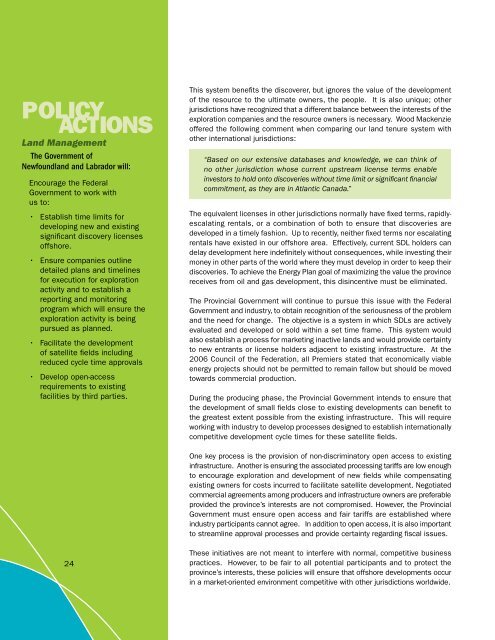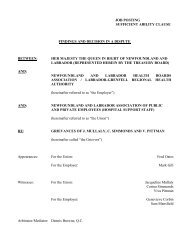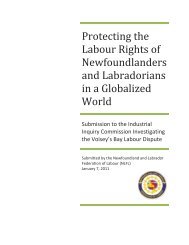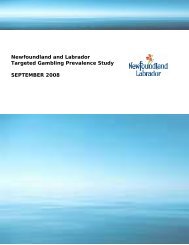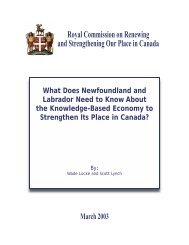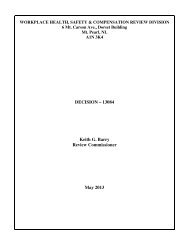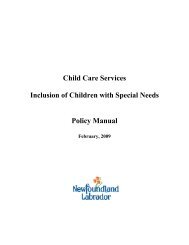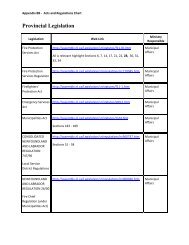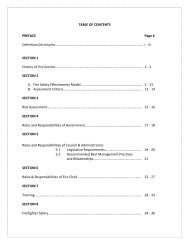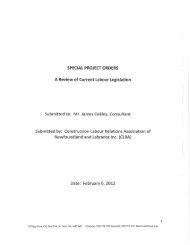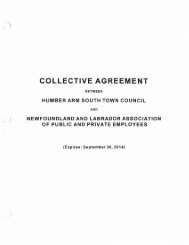Energy Plan - Government of Newfoundland and Labrador
Energy Plan - Government of Newfoundland and Labrador
Energy Plan - Government of Newfoundland and Labrador
You also want an ePaper? Increase the reach of your titles
YUMPU automatically turns print PDFs into web optimized ePapers that Google loves.
POLICY<br />
ACTIONS<br />
L<strong>and</strong> Management<br />
The <strong>Government</strong> <strong>of</strong><br />
<strong>Newfoundl<strong>and</strong></strong> <strong>and</strong> <strong>Labrador</strong> will:<br />
Encourage the Federal<br />
<strong>Government</strong> to work with<br />
us to:<br />
• Establish time limits for<br />
developing new <strong>and</strong> existing<br />
significant discovery licenses<br />
<strong>of</strong>fshore.<br />
• Ensure companies outline<br />
detailed plans <strong>and</strong> timelines<br />
for execution for exploration<br />
activity <strong>and</strong> to establish a<br />
reporting <strong>and</strong> monitoring<br />
program which will ensure the<br />
exploration activity is being<br />
pursued as planned.<br />
• Facilitate the development<br />
<strong>of</strong> satellite fields including<br />
reduced cycle time approvals<br />
• Develop open-access<br />
requirements to existing<br />
facilities by third parties.<br />
This system benefits the discoverer, but ignores the value <strong>of</strong> the development<br />
<strong>of</strong> the resource to the ultimate owners, the people. It is also unique; other<br />
jurisdictions have recognized that a different balance between the interests <strong>of</strong> the<br />
exploration companies <strong>and</strong> the resource owners is necessary. Wood Mackenzie<br />
<strong>of</strong>fered the following comment when comparing our l<strong>and</strong> tenure system with<br />
other international jurisdictions:<br />
“Based on our extensive databases <strong>and</strong> knowledge, we can think <strong>of</strong><br />
no other jurisdiction whose current upstream license terms enable<br />
investors to hold onto discoveries without time limit or significant financial<br />
commitment, as they are in Atlantic Canada.”<br />
The equivalent licenses in other jurisdictions normally have fixed terms, rapidlyescalating<br />
rentals, or a combination <strong>of</strong> both to ensure that discoveries are<br />
developed in a timely fashion. Up to recently, neither fixed terms nor escalating<br />
rentals have existed in our <strong>of</strong>fshore area. Effectively, current SDL holders can<br />
delay development here indefinitely without consequences, while investing their<br />
money in other parts <strong>of</strong> the world where they must develop in order to keep their<br />
discoveries. To achieve the <strong>Energy</strong> <strong>Plan</strong> goal <strong>of</strong> maximizing the value the province<br />
receives from oil <strong>and</strong> gas development, this disincentive must be eliminated.<br />
The Provincial <strong>Government</strong> will continue to pursue this issue with the Federal<br />
<strong>Government</strong> <strong>and</strong> industry, to obtain recognition <strong>of</strong> the seriousness <strong>of</strong> the problem<br />
<strong>and</strong> the need for change. The objective is a system in which SDLs are actively<br />
evaluated <strong>and</strong> developed or sold within a set time frame. This system would<br />
also establish a process for marketing inactive l<strong>and</strong>s <strong>and</strong> would provide certainty<br />
to new entrants or license holders adjacent to existing infrastructure. At the<br />
2006 Council <strong>of</strong> the Federation, all Premiers stated that economically viable<br />
energy projects should not be permitted to remain fallow but should be moved<br />
towards commercial production.<br />
During the producing phase, the Provincial <strong>Government</strong> intends to ensure that<br />
the development <strong>of</strong> small fields close to existing developments can benefit to<br />
the greatest extent possible from the existing infrastructure. This will require<br />
working with industry to develop processes designed to establish internationally<br />
competitive development cycle times for these satellite fields.<br />
One key process is the provision <strong>of</strong> non-discriminatory open access to existing<br />
infrastructure. Another is ensuring the associated processing tariffs are low enough<br />
to encourage exploration <strong>and</strong> development <strong>of</strong> new fields while compensating<br />
existing owners for costs incurred to facilitate satellite development. Negotiated<br />
commercial agreements among producers <strong>and</strong> infrastructure owners are preferable<br />
provided the province’s interests are not compromised. However, the Provincial<br />
<strong>Government</strong> must ensure open access <strong>and</strong> fair tariffs are established where<br />
industry participants cannot agree. In addition to open access, it is also important<br />
to streamline approval processes <strong>and</strong> provide certainty regarding fiscal issues.<br />
24<br />
These initiatives are not meant to interfere with normal, competitive business<br />
practices. However, to be fair to all potential participants <strong>and</strong> to protect the<br />
province’s interests, these policies will ensure that <strong>of</strong>fshore developments occur<br />
in a market-oriented environment competitive with other jurisdictions worldwide.


